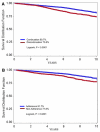Early discontinuation and non-adherence to adjuvant hormonal therapy are associated with increased mortality in women with breast cancer
- PMID: 20803066
- PMCID: PMC3462663
- DOI: 10.1007/s10549-010-1132-4
Early discontinuation and non-adherence to adjuvant hormonal therapy are associated with increased mortality in women with breast cancer
Abstract
Despite the benefit of adjuvant hormonal therapy (HT) on mortality among women with breast cancer (BC), many women are non-adherent with its use. We investigated the effects of early discontinuation and non-adherence to HT on mortality in women enrolled in Kaiser Permanente of Northern California (KPNC). We identified women diagnosed with hormone-sensitive stage I-III BC, 1996-2007, and used automated pharmacy records to identify prescriptions and dates of refill. We categorized patients as having discontinued HT early if 180 days elapsed from the prior prescription. For those who continued, we categorized patients as adherent if the medication possession ratio was ≥80%. We used Cox proportional hazards models to estimate the association between discontinuation and non-adherence with all-cause mortality. Among 8,769 women who filled at least one prescription for HT, 2,761 (31%) discontinued therapy. Of those who continued HT, 1,684 (28%) were non-adherent. During a median follow-up of 4.4 years, 813 women died. Estimated survival at 10 years was 80.7% for women who continued HT versus 73.6% for those who discontinued (P < 0.001). Of those who continued, survival at 10 years was 81.7 and 77.8% in women who adhered and non-adhered, respectively (P < 0.001). Adjusting for clinical and demographic variables, both early discontinuation (HR 1.26, 95% CI 1.09-1.46) and non-adherence (HR 1.49, 95% CI 1.23-1.81), among those who continued, were independent predictors of mortality. Both early discontinuation and non-adherence to HT were common and associated with increased mortality. Interventions to improve continuation of and adherence to HT may be critical to improve BC survival.
Figures


References
-
- Winer EP, Hudis C, Burstein HJ, Wolff AC, Pritchard KI, Ingle JN, Chlebowski RT, Gelber R, Edge SB, Gralow J, et al. American Society of Clinical Oncology technology assessment on the use of aromatase inhibitors as adjuvant therapy for post-menopausal women with hormone receptor-positive breast cancer: status report 2004. J Clin Oncol. 2005;23(3):619–629. - PubMed
-
- Effects of chemotherapy and hormonal therapy for early breast cancer on recurrence and 15-year survival: an overview of the randomised trials. Lancet. 2005;365(9472):1687–1717. - PubMed
-
- Ziller V, Kalder M, Albert US, Holzhauer W, Ziller M, Wagner U, Hadji P. Adherence to adjuvant endocrine therapy in postmenopausal women with breast cancer. Ann Oncol. 2009;20(3):431–436. - PubMed
-
- Partridge AH, LaFountain A, Mayer E, Taylor BS, Winer E, Asnis-Alibozek A. Adherence to initial adjuvant anastrozole therapy among women with early-stage breast cancer. J Clin Oncol. 2008;26(4):556–562. - PubMed
Publication types
MeSH terms
Substances
Grants and funding
LinkOut - more resources
Full Text Sources
Other Literature Sources
Medical
Molecular Biology Databases

